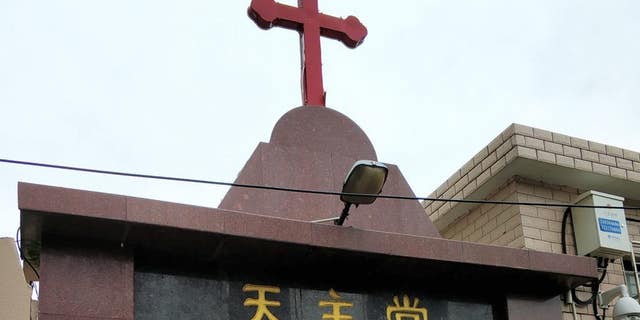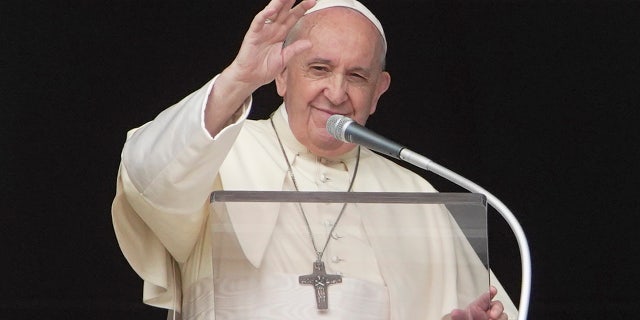The Vatican is in the process of renewing a deal with the Chinese Communist Party, raising concerns among U.S. officials and human rights advocates who note that China is one of the most dangerous places on the planet to be Christian.
While the precise terms of the two-year-old agreement are undisclosed, observers say the pope and Beijing will share jurisdiction in the appointment of bishops.
“The first agreement, signed in 2018, was intended to be experimental, but its results have been grim. In the past two years alone, the Chinese government has raided church services, imprisoned non-compliant priests and removed crosses from churches,” David Curry, CEO of international religious persecution watchdog, Open Doors USA, told Fox News. “(The deal) gives the Vatican and the CCP shared authority over the appointment of bishops in the country.”

The Christian community are far from the only religious minority facing the throes of maltreatment. More than one million Uighur Muslims have been forced into concentration camps and subjected to everything from forced labor to forced abortion and sterilization – and the Buddhist-centric Falun Gong community have long endured involuntary organ harvesting, torture and arbitrary detainment in China
(Courtesy Open Doors USA)
The initial agreement was designed to resolve the fissure among the country’s 12 million Catholics – half who attend state-sanctioned and monitored religious services under the “Chinese Patriotic Catholic Association,” and the other half, which remains loyal to the Holy See and traditional Catholicism and practice in “underground” churches in private homes and in secret.
Attending such unauthorized services is strictly illegal and comes with the hefty price of imprisonment – or worse.
Under Mao Zedong in the early 1950s, China severed diplomatic ties with the Vatican, razed churches and deported missionaries before setting up its own Catholic Association. Under this self-styled guild, the CCP retained the right to ordain bishops without the Vatican’s approval. In sealing a deal more than two years ago, the Vatican’s goal was to take back control of the process.
POPE: GOSSIPING IS “PLAGUE WORSE THAN COVID”
However, the arrangement – both in its initial formulation and in the current practice – has been criticized as turning a blind eye to Beijing’s abuses. Those include banning crosses and changing parables to fit Beijing’s vision of social norms.
In one case just weeks ago, according to the National Review, a government-issued high school textbook changed a Bible story “to turn one of Jesus’s key teachings on its head: After inducing others not to cast stones at a woman who has sinned, Jesus himself stones her.”
Critics have also pointed out that the contract is not merely about the Vatican being in charge of the bishop approval procedure but that it has also been put in a position to recognize the CCP appointees as legitimate.
“The current deal gives the Vatican an official presence in the country through registered churches, preventing the Catholic Church from having to operate underground in China. But an official church presence is on China’s terms,” Curry stressed. “It allows China say in appointing Communist sympathizers as bishops and permits surveillance-state technology to monitor who attends services.”

FILE — In this Sept. 20, 2020 file photo, Pope Francis delivers his blessing as he recites the Angelus noon prayer from the window of his studio overlooking St.Peter’s Square, at the Vatican. The pontiff on Saturday, Oct. 10 recorded a video message to a TED conference on climate change, that will be released later Saturday night. (AP Photo/Andrew Medichini)
On the flip side, the Vatican and other defenders of the deal have praised it as opening the pathway to better relations, the unification of the divided Catholic community, and the overall improved treatment of the faith’s followers.
Andrea Gagliarducci, a Vatican analyst at the Catholic News Agency, told Fox News that the only plus side for the Holy See would be that it might have some leverage to appeal in extreme cases given an agreement is in place, but that “China can benefit a lot, in terms of opportunity, by having an agreement with the Vatican.”
“The Holy See is immensely respected in the international arena, and the Chinese hope is also likely that an agreement with the Holy See would help China to clean up its image in front of the world,” he said.
Nonetheless, Pope Francis’s bid for stronger ties has come at a time when the Trump-led administration is pushing back against the CCP’s abuses and misgivings on a very public stage.
Earlier this month, U.S. Secretary of State Mike Pompeo – who visited Rome in late September but was rebuffed by Pope Francis who declined to meet on the basis of refraining from “political” dialogue so close to a Presidential election – has called on the Vatican to take a more “serious” approach to condemn human rights abuses and religious targeting by Chinese authorities.
And despite initial hopes negotiations would facilitate stronger relations and better support for the deeply persecuted, analysts say human rights abuses have only worsened. While the CCP has historically perceived religious independence and theology as a threat to its iron-fisted rule, under the thumb of President Xi Jinping, the party has moved more toward “controlling” it rather than elimination in a policy termed “Sinicization.”
In effect, this establishes state-sanctioned religious institutions to monitor and modify the way individuals practice their faith. In early 2018, under Sinicization, state-registered religious organizations were granted authority to publish texts, possess property, train clergy, and collect donations. But at the same time, the CCP enhanced its power to inflict more stringent controls, such as restricting schooling, and the times and locations of services, as well as mandating reports on monetary donations exceeding $15,900.
POMPEO DEFENDS CRITICIZING VATICAN OVER CHINA TIES
Under Jinping’s reign, faith groups are also required to contour their philosophies to align with the officially atheist doctrine, and as of this year, all religious factions are – by law – bound to accepting and disseminating CCP ideology and values. They also must seek authorization from a government affairs office prior to holding any religious gatherings or activities.
To date, China still has one of the world’s largest populations of religious prisoners – believed to be well into the tens of thousands – with pastors and faith followers routinely swept up in police crackdowns, “disappeared” in the dead of night, and detained in dark dungeons and killed with impunity.
“The violations of the human rights of all Christians, despite denomination, in China are overwhelming,” lamented Washington-based Bishop Joseph Grieboski. “(Yet this) deal allows the Vatican partial control over the appointment of bishops while giving Beijing the P.R. victory of saying that the Vatican sides with their choices for bishops. To be frank, the deal benefits the Chinese Communist Party far more than it does the Holy See.”
The Christian community is not the only religious minority facing maltreatment. More than one million Uighur Muslims have been forced into concentration camps and subjected to everything from forced labor to forced abortion and sterilization – and the Buddhist-centric Falun Gong community has long endured involuntary organ harvesting, torture, and arbitrary detainment.
CLICK HERE TO GET THE FOX NEWS APP
In Curry’s view, the Vatican has forfeited a rare negotiating chip in the fight against religious persecution in China.
“People who are imprisoned for their faith have few advocates with voices loud enough for the regime to hear. The Vatican can be a powerful voice of hope for religious minorities in China, and I certainly hope they answer that call in the future,” he added. “Refusing to sign the deal would have sent a signal that churches are sacred places, and faith is beyond the reach of the Chinese communist agenda.”